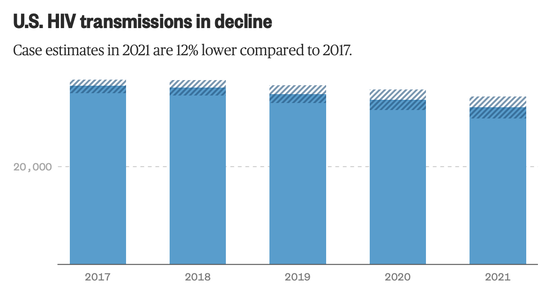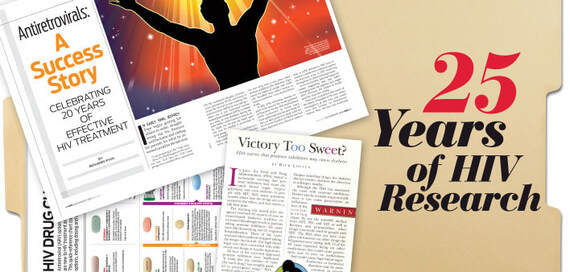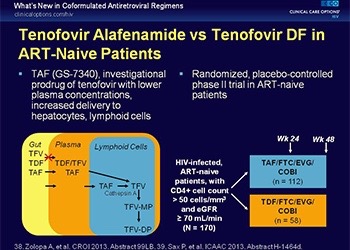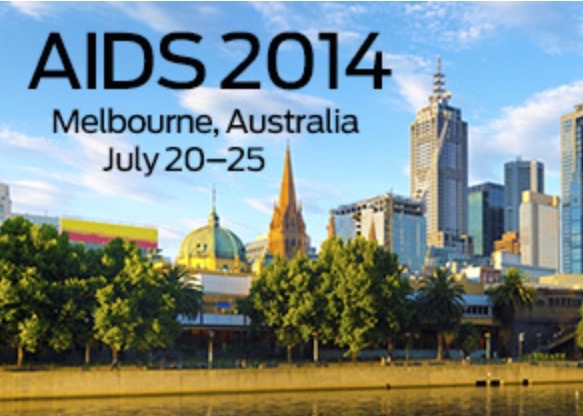HIV Treatment

U.S. progress in HIV fight continues to trail many other rich nations
NBC News, May 23, 2023
New HIV infections continue to ebb only modestly in the United States, while many other wealthy Western nations have posted steep reductions, thanks to more successful efforts overseas to promptly diagnose and treat the virus and promote the HIV prevention pill, PrEP.
NBC News, May 23, 2023
New HIV infections continue to ebb only modestly in the United States, while many other wealthy Western nations have posted steep reductions, thanks to more successful efforts overseas to promptly diagnose and treat the virus and promote the HIV prevention pill, PrEP.

'This will shut us down': HIV prevention clinics brace for Gilead reimbursement cuts
NBC News, July 2021
HIV prevention clinics are facing a fiscal crisis owing to the vagaries of an arcane federal drug pricing law, with a bare minimum of $100 million annually expected to drain from the nonprofits starting in 2022. This devastating loss of funds, which is expected to shut down some clinics, comes just as the federal government has ramped up spending in an effort to essentially end the HIV epidemic by 2030.
NBC News, July 2021
HIV prevention clinics are facing a fiscal crisis owing to the vagaries of an arcane federal drug pricing law, with a bare minimum of $100 million annually expected to drain from the nonprofits starting in 2022. This devastating loss of funds, which is expected to shut down some clinics, comes just as the federal government has ramped up spending in an effort to essentially end the HIV epidemic by 2030.

25 Years of HIV Research
POZ, July 2019
To mark POZ magazine's 25th anniversary: a review of the extra-ordinary achievements on the part of HIV scientists since 1994. The ever-refined collective mastery they have gained over the virus during this period represents one of the greatest achievements of human ingenuity.
POZ, July 2019
To mark POZ magazine's 25th anniversary: a review of the extra-ordinary achievements on the part of HIV scientists since 1994. The ever-refined collective mastery they have gained over the virus during this period represents one of the greatest achievements of human ingenuity.

Is Gilead’s Entire HIV Enterprise Built on a False Promise?
POZ, May 2018
Gilead Sciences' updated version of its key HIV drug tenofovir may not actually offer any safety benefits when it isn't paired with a so-called boosting agent. A major study is underway comparing the efficacy as PrEP of Truvada, which contains the old tenofovir and no booster, with Descovy, an equivalent tablet including the updated tenofovir. Will Descovy prove significantly safer or is the study for naught?
POZ, May 2018
Gilead Sciences' updated version of its key HIV drug tenofovir may not actually offer any safety benefits when it isn't paired with a so-called boosting agent. A major study is underway comparing the efficacy as PrEP of Truvada, which contains the old tenofovir and no booster, with Descovy, an equivalent tablet including the updated tenofovir. Will Descovy prove significantly safer or is the study for naught?

An Exciting Act II for the Study That Proved Treating HIV Early Is Best
POZ, February 2018
The scientists behind the global START study recently won a new funding stream from the the National Institutes for Health to continue following the large population of participants for another four years, through 2021.
POZ, February 2018
The scientists behind the global START study recently won a new funding stream from the the National Institutes for Health to continue following the large population of participants for another four years, through 2021.

"Nevertheless They Persisted"
(POZ, September 2017)
In the face of potential budget cutbacks or continued flat funding, HIV scientists and advocates are waging a powerful war against the global epidemic. The 9th International AIDS Society Conference on HIV Science in Paris saw myriad reasons for hope but also considerable cause for concern about the future of the global fight.
(POZ, September 2017)
In the face of potential budget cutbacks or continued flat funding, HIV scientists and advocates are waging a powerful war against the global epidemic. The 9th International AIDS Society Conference on HIV Science in Paris saw myriad reasons for hope but also considerable cause for concern about the future of the global fight.

"International HIV Conference Reveals Exciting Progress in Global HIV Fight"
(POZ, August 2017)
The fight to combat the global HIV epidemic is charting exciting progress. This includes a rapidly increasing proportion of those living with the virus on treatment as well as falling infection and AIDS-related death rates. But considerable challenges remain.
(POZ, August 2017)
The fight to combat the global HIV epidemic is charting exciting progress. This includes a rapidly increasing proportion of those living with the virus on treatment as well as falling infection and AIDS-related death rates. But considerable challenges remain.

"HIV 2020"
(POZ, June 2017)
The dawning of the 2020s will bring HIV into its fifth decade. Crystal balls are by their nature hazy, and the current political climate raises many worrisome questions about how shifting federal priorities may affect people living with and at risk for HIV. Nevertheless, thanks to recent promising strides in HIV research and public health efforts to tackle the virus from all sides, leaders in the field are increasingly optimistic about what the next decade of the epidemic will look like.
(POZ, June 2017)
The dawning of the 2020s will bring HIV into its fifth decade. Crystal balls are by their nature hazy, and the current political climate raises many worrisome questions about how shifting federal priorities may affect people living with and at risk for HIV. Nevertheless, thanks to recent promising strides in HIV research and public health efforts to tackle the virus from all sides, leaders in the field are increasingly optimistic about what the next decade of the epidemic will look like.

"Living to a Ripe Old Age With HIV"
(POZ, December 2016)
The need to better understand the health care needs of older HIV-positive people is growing increasingly urgent. Thanks to the life-extending benefits of antiretroviral treatment, individuals at the upper end of the age spectrum among those living with the virus today will become the first sizable generation to live into their golden years.
(POZ, December 2016)
The need to better understand the health care needs of older HIV-positive people is growing increasingly urgent. Thanks to the life-extending benefits of antiretroviral treatment, individuals at the upper end of the age spectrum among those living with the virus today will become the first sizable generation to live into their golden years.

"There’s Never Been a Better Time to Get Pregnant If One of You Has HIV"
(POZ, Sept. 2016)
Mounting evidence suggests that people with HIV virtually eliminate their risk of transmitting the virus to others by fully suppressing their virus through ARV treatment. In fact, the risk of transmitting HIV with an undetectable viral load may be zero.
(POZ, Sept. 2016)
Mounting evidence suggests that people with HIV virtually eliminate their risk of transmitting the virus to others by fully suppressing their virus through ARV treatment. In fact, the risk of transmitting HIV with an undetectable viral load may be zero.

"Is the U.S. HIV Epidemic in Much Better Shape Than We’ve Thought?"
(POZ, May 2016)
Here’s the good news: There may be considerably fewer people living with HIV in the United States, and the HIV population may have a much higher rate of viral suppression than the Centers for Disease Control and Prevention (CDC) has estimated. The bad news is that the CDC’s potentially faulty estimates may have thrown off various other presumptions about the state of the U.S. HIV epidemic and what efforts are needed to drive down new infections.
(POZ, May 2016)
Here’s the good news: There may be considerably fewer people living with HIV in the United States, and the HIV population may have a much higher rate of viral suppression than the Centers for Disease Control and Prevention (CDC) has estimated. The bad news is that the CDC’s potentially faulty estimates may have thrown off various other presumptions about the state of the U.S. HIV epidemic and what efforts are needed to drive down new infections.

"What Is Chronic Inflammation and Why Is It Such a Big Deal for People With HIV?" (POZ, April 2016)
Antiretrovirals have added decades to the life spans of people living with HIV who have access to treatment. Nevertheless, when compared with HIV-negative people, those taking treatment for the virus still have a higher risk of various health problems typically associated with aging. The reasons behind these increased health risks still aren’t very well understood, but the scientific community is eagerly looking for answers. Researchers are inclined to point the finger at a phenomenon known as chronic inflammation as a main culprit.
Antiretrovirals have added decades to the life spans of people living with HIV who have access to treatment. Nevertheless, when compared with HIV-negative people, those taking treatment for the virus still have a higher risk of various health problems typically associated with aging. The reasons behind these increased health risks still aren’t very well understood, but the scientific community is eagerly looking for answers. Researchers are inclined to point the finger at a phenomenon known as chronic inflammation as a main culprit.

"Is Charlie Sheen Pining After the Wrong Clinical Trial of Long-Acting HIV Meds?"(POZ, March 2016)
During his February appearance on The Dr. Oz Show, Charlie Sheen said his profound dislike of adhering to a daily HIV regimen had piqued his interest in participating in a clinical trial of an investigational treatment called PRO 140, which is a weekly self-injectable monoclonal antibody against the virus. But would he be better off joining a trial of a longer-acting treatment, one dosed only every eight weeks?
During his February appearance on The Dr. Oz Show, Charlie Sheen said his profound dislike of adhering to a daily HIV regimen had piqued his interest in participating in a clinical trial of an investigational treatment called PRO 140, which is a weekly self-injectable monoclonal antibody against the virus. But would he be better off joining a trial of a longer-acting treatment, one dosed only every eight weeks?

“At Last, Gold-Standard Evidence Backs Early Treatment of HIV.”
(POZ, June 2015) The hotly anticipated START trial, designed to answer whether starting HIV treatment at a high CD4 count is preferable to delaying, has been halted more than a year early due to powerful evidence supporting early treatment. Anthony S. Fauci, MD, director of the National Institute of Allergy and Infectious Diseases (NIAID), which was the primary backer of the study, told reporters in a May 27 teleconference that the study findings mean that people with HIV will benefit from ARVs regardless of their CD4 level.
(POZ, June 2015) The hotly anticipated START trial, designed to answer whether starting HIV treatment at a high CD4 count is preferable to delaying, has been halted more than a year early due to powerful evidence supporting early treatment. Anthony S. Fauci, MD, director of the National Institute of Allergy and Infectious Diseases (NIAID), which was the primary backer of the study, told reporters in a May 27 teleconference that the study findings mean that people with HIV will benefit from ARVs regardless of their CD4 level.
|
“It’s Time for Tenofovir 2.0.” (POZ, December 2014) One of the most important drugs in the HIV arsenal is getting a tune-up, making it less toxic.
|
“20th International AIDS Conference Research Highlights.” (POZ, Aug. 2014) A summary of major findings presented at AIDS 2014: on PrEP, hep C, testing.
|
“Jetsons-Era HIV Care and Prevention.” (POZ, April 2014) Futuristic highlights from the Conference on Retroviruses and Opportunistic Infections in Boston.
|
- POZ, Sept. 2015: “The Coinfection Challenge.” New treatment options for people living with HIV and hepatitis C.
- POZ, May 2015: “The Audacity of New York's Hope to End AIDS” Can the Empire State end its epidemic by the end of the decade? And what exactly would it mean to do so?
- POZ, Nov.2014: “The Treatment Divide: When’s the Best Time to Start HIV Meds?” A debate [later answered by the START trial] is raging between activists over whether treating HIV when CD4 cells are high is scientifically sound.
- POZ, Oct. 2014: “Selling the End of AIDS.” As slogans anticipating an end to the AIDS epidemic gain popularity, skeptics worry that such promises are hollow and unrealistically ambitious, and that failure to deliver will ultimately set back efforts to combat HIV.
- POZ, Feb. 2014: “THC in Pot Affects Monkey SIV; Half-Baked HIV Reports Follow.”
- POZ, May 2014: “Media Cooks Up Claim That Soy Sauce Treats, Even Cures HIV.”
- POZ, March 2013: “Falling Through the Cracks.” We can strengthen two of the weakest links in the U.S. health care chain for people with HIV/AIDS—linking people to care and retaining them in care. Doing so requires a collective approach.
- POZ, Dec. 2012: “Mixed Messages on Meds and Booze.” Many skip their HIV meds when they drink. This is a mistake.
- POZ, Oct. 2011: “Getting HIV Care Without Getting Deported.” Treatment options and help are available for people with HIV—and without immigration papers.
- POZ, Sept. 2011: “Facing the Future of HIV Care.” How AIDS service organizations are adapting fiscally to meet a changing health policy landscape.
- POZ, April 2011: “It’s in the Mail.” Make sure your drugs get delivered without delay.
- HIV Plus, July 2010: “2010 & Beyond.” The future of HIV care and treatment.
- HIV Plus, July 2009: “Designer Medicine.” HIV gene therapy research.
- Gay.com, Aug. 2006: "The once-a-day HIV pill, Rejoice, but with caution."
- HIV Plus, July 2005: “Survivor.” A profile of Nelson Vergel, long-term survivor of HIV, shines a spotlight on the plight of those with few HIV treatment options.
- HIV Plus, July 2005: “The Good Fight.” Fighting resistance to HIV medications.
- HIV Plus, April 2005: “Winning the Crazy Numbers Game.” The fight to score good numbers in lab tests.
- HIV Plus, Dec. 2004: “Rx for Success.” Tips on having a successful visit to the doctor.


